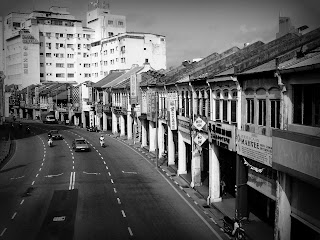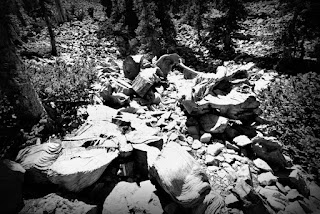The day Tommy-T
died, he had his bomb with him, strapped to his back as usual. It was a Tuesday,
early June, but hot like August. That noon, he dragged himself to Maggie’s down
on the square and sat in a corner booth and ordered a glass of ice-water and the
special, which that day was a pork loin sandwich and potato salad. They knew
him there and when he came in no one stared at him or made a fuss like they
might have other places. The waitress, a girl named Lisa Shultz who’d been
working there since high school, was nice to him, though she did share a knowing
smile with the Cook when she pinned the order up and said this one’s for Tommy-T.
When Tommy-T
first began carrying his bomb around, folks were fearful of him. That was years
earlier, when he was young and his psychosis warranted more attention. The
story’s that the cops brought him in and questioned him and examined the bomb
and asked him about his plans for it. He said he had no plans; that his job was
only to carry the thing. He said that was all he knew.
You wanna
blow something up? They asked him.
For now, I
just wanna go on my way and not be disturbed, he told them.
Tommy-T wasn’t
friendly, but when asked, he’d give folks an explanation for the bomb. Most
people knew the details. The bomb had been delivered to him by a man-who-gave-no-name
from a secretive government organization that Tommy-T said wasn’t the CIA but
was like the CIA. This man-who-gave-no-name told him to carry it with him
wherever he went, no matter the time of day or occasion. There were no other
instructions given.
People told
this story, but they also told what they had seen when they’d been close enough
to Tommy-T to take a look at his bomb. It was mostly an old Hoover vacuum with the tube removed,
just the cylindrical body left. Who ever put the thing together had also
painted it black and strapped a double-slot toaster to the top of it. The knob
on the toaster was painted red, and beside it, Tommy-T had used a thick marker
to write DO NOT TOUCH.
Tommy-T, is
that bomb for real? He’d been asked time and again.
I trust so,
he’d say.
But the cops
who’d looked at it said it wasn’t. They said it was just parts taped and glued
and screwed together. Nothing dangerous; nothing that could cause any harm. So,
they allowed him to carry it around town, rigged to a metal-frame with shoulder
straps that also looked homemade. He had it on him always.
Once, they
say a boy went for it and tried to press on that red-painted toaster knob and that
Tommy-T grabbed the boy and pushed him into a brick wall outside of Ray’s Donuts. When the boy told folks, he
said Tommy-T had shouted that he’d almost
blown up the world. He said the boy’d
almost killed everybody.
That was
something folks were surprised to hear. No one had ever asked Tommy-T what would
happen if his bomb exploded. People assumed the bomb was a type of protection
for Tommy-T. He didn’t like being close to people, so the bomb was a way to
keep his distance. But then the boy tells folks that Tommy-T thinks that bomb
will blow up the whole planet. He thought he had the end of the world strapped
to his back.
In the
community, this knowledge made him even more of a tragic figure. To some he was
only a joke, but from a great number of people there was sympathy for the
burden Tommy-T must have felt carrying that thing around. Folks wondered how he
slept at night with that bomb beside him and no one to stand watch over it.
There was something cruel in his delusion, an heavy weight placed literally
on his shoulders. But of course, the cruelty was self-inflicted. The
man-who-gave-no-name was Tommy-T himself, and nobody knew how to persuade him
of that truth.
People
talked about helping him; about putting him in a facility or giving him
medication. A man named Donald Copeland even went to Tommy-T’s small home on
Division Street one afternoon and asked Tommy-T if he would like someone to
carry the bomb around for a few days, just to give him a break. But Tommy-T
said no, and told Copeland to stay off his property from then on. He said he
knew what Copeland was up to and that he couldn’t be tricked.
So, though
no one could deny Tommy-T’s oddness, neither could anyone justify taking him
from his home and putting him in a facility when in most ways he seemed capable
of taking care of himself. Some folks said, apart from that bomb, he was a
pretty normal guy. Cranky and shy, but no danger to himself or anyone else as
far as people knew.
That
Tuesday, when he walked into Maggie’s and took the booth in the corner, he had
the bomb with him. The waitress said he was acting normal; quiet like usual. He
removed the bomb and placed it on the booth seat beside him and ordered his
food and made no eye contact with the waitress or anyone else in the café. His
sandwich arrived and he took a few bites and set it aside and, according to a
few patrons nearby,
he stared at the surface of the table for a very long time,
like he was in a trance.
The coroner,
Jim Holcomb, later said it was a massive stroke that killed Tommy-T. After
sitting statue-like for a time, he started flailing about and knocked over his
ice-water and all the folks eating there took notice and gathered around him.
Someone called for an ambulance. They
tried to help, but it happened quick. Coroner said it was bleeding in the
brain, the worst kind of stroke that can happen.
When the
witnesses started telling their stories around town, one detail got people’s
attention. The folks who were there in Tommy-T’s last minute say that as he was
going down, he took hold of that bomb and pulled down on the red knob. When
nothing happened, he pulled again, and then a third time, before he lost
control of his body and tumbled over. One lady said maybe he was just reaching
for something to hold onto. But most of them said they thought he looked
determined. They say he knew he was dying and wanted to set that bomb off before
he lost the chance.
No one knows,
and Tommy-T is dead.
* * * * *
To learn more about Special Atomic Demolition Munitions, read the original Wikipedia article HERE.






